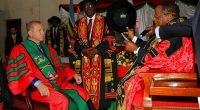Dozens detained in gov’t witch-hunt against Gülen movement

Date posted: November 12, 2015
As part of an escalating witch-hunt against groups affiliated with the Gülen movement, the police have arbitrarily detained dozens of people across the country, including human rights defenders and philanthropists, using bullying tactics and unlawfully cuffing law-abiding citizens.
A total of 48 people were detained in operations conducted in a number provinces including Bursa, Diyarbakır, Eskişehir, İstanbul, Kayseri, Manisa and Tokat late Monday and early Tuesday on charges of providing financial support to alleged members of the “parallel structure,” a pretext invented by President Recep Tayyip Erdoğan to refer to the civic movement inspired by Islamic scholar Fethullah Gülen.
The sweeping detentions came on the same day that the European Union harshly criticized the Turkish government for the severe backslide in the rule of law, violations of due process and overt political influence in judicial investigations.
The operation in Manisa was authorized by the Manisa Chief Public Prosecutor’s Office based on “reasonable suspicion” and was carried out by police officers from the Manisa Police Department on 35 locations simultaneously.
According to the Cihan news agency, doctors, lawyers, businessmen, educators and contractors were among the 26 people detained in the operation in Manisa, along with a department chief of Bank Asya, Turkey’s largest Islamic lender that was founded by Hizmet sympathizers in 1996.
The police handcuffed 26 people including lawyers, educators and headscarved women and paraded them on the street until they were escorted to police cars. The footage, aired on several national networks and posted on social media, drew harsh condemnation from the public.
Manisa Bar Association Head Ali Arslan described the detentions as unlawful, saying placing handcuffs on people who were detained was against rules and procedures. He underlined that the rights of citizens had been violated.
Some on social media contrasted the images in Manisa to one where a leading Islamic State in Iraq and the Levant (ISIL) suspect was pictured not handcuffed when he and his wife were taken into police custody. In July, alleged ISIL cell leader Halis Bayancuk, also known as Abu Hanzala, who called for a holy war, was detained in İstanbul along with his wife. Bayancuk was arrested last year but later was released.
Police procedures require that handcuffs be placed on suspects only when he or she might flee or pose a physical threat to the safety of the police.
Arslan also noted that the detention of leading lawyers by police in a dawn raid of their homes has infringed the rights of the lawyers as protected by the law. “These people are very well known in Manisa; they attend hearings in the courtroom every day. They could have been summoned to testify instead of being detained,” he explained.
The detainees were sent to the Manisa Police Department for interrogation after they underwent medical examinations at Manisa State Hospital.
The police are searching for eight more people within the scope of the operation.
Officers from the Anti-Smuggling and Organized Crime Bureau and counterterrorism units also detained 21 people in Eskişehir-based operations carried out in İstanbul, Bursa, Diyarbakır, Kayseri and Tokat.
During the operation authorized by the Eskişehir deputy chief public prosecutor, police raided the offices and homes of a number of people in Eskişehir early on Tuesday as a part of a government-backed operation targeting the faith-based Gülen movement.
According to a written statement released by the Eskişehir Chief Public Prosecutor’s Office on Tuesday, 21 people were detained on charges that include forming and running a terrorist organization, forging documents as part of terrorist organization activities and opposing the laws of associations and charity collection.
According to the Cihan news agency, a dormitory was also simultaneously raided, with police officers arriving in seven vehicles. The officers confiscated notes used by students to study for the upcoming midterms as evidence.
Turgay Balaban, a lawyer representing people whose houses and offices were raided, announced the operation on his Twitter account at around 6 a.m., saying: “[The police] launched as of this moment an operation against those whom the powerful call terrorists and whom we call benefactors in Eskişehir. Let’s see what they find!”
Balaban also said on Twitter the operation was conducted on the charges of attempting to destroy the government of the Republic of Turkey and prevent it from performing its duties by using force and violence.
Police officers took photos of the dailies Zaman, Bugün, Meydan, Taraf and the Aksiyon weekly found in offices and houses during the search as evidence.
President Erdoğan and his political associates have for some time accused the Gülen movement, also known as the Hizmet movement and inspired by the ideas of Turkish Islamic scholar Fethullah Gülen, of being a terrorist organization, despite the absence of any concrete evidence. Gülen is a critic of the government, accusing it of being corrupt, engaging in favoritism and abusing religion for political and personal gain. Erdoğan has relentlessly targeted Gülen following a graft scandal that erupted in December 2013 and implicated members of his family and senior government officials.
An amendment passed in December 2014 makes it possible for the authorities to detain anyone on “reasonable suspicion” without any need for firm evidence. With the law, the threshold for the burden of proof required for obtaining a search warrant was reduced from strong and credible evidence to mere reasonable suspicion. The police are not only able to easily search any individual, home or vehicle, but can also easily seize the property of all suspects on the grounds of having committed a crime against the government.
Source: Today's Zaman , November 10, 2015
Tags: Defamation of Hizmet | Hizmet and politics | Turkey |
























